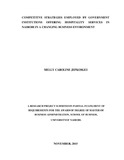| dc.description.abstract | The Hospitality Industry in Kenya over the last ten years can be said to have experienced different set of competition than earlier existing in the sector. This is in line with Kenya’s Vision 2030 where Kenya should be among the top 10 tourist destinations in the world offering diverse and distinctive experience with an emphasis on high quality service. This has led to many products and services development within the same period. The study sought to determine the competitive strategies employed by government institutions offering hospitality services in Nairobi in a changing business environment. To achieve this objective the study used a cross-sectional research descriptive design. The population of the study comprised of all government institutions licensed to offer hospitality services in Nairobi. All of the twelve institutions participated hence the study was a census. Primary data was collected using a self-administered questionnaire that consisted of structured questions made up of both open and closed ended questions that were designed to elicit specific responses for qualitative and quantitative analysis respectively. The study managed to collect data from all the 12 government institutions licensed to offer hospitality services in Nairobi. The study found that the most popular competitive strategies used by hospitality institutions in government were pricing strategy; differentiation and cost leadership strategies. It was revealed that most hospitality institutions charged lower prices for their services. Cost focus strategy was least implemented by the institutions in Nairobi County. The limitation for this study is that some of the managers were too busy and thus some of the questionnaires were filled by the assistant managers other than the managers who were the target respondents for this study. The study recommends that the government should continue investing in modern technologies for example information communication technologies in order to enhance efficiency and quality services to their customers. This cannot however be achieved without proper investment in technology infrastructure. The study recommends for further study on the effect of differentiation strategies on sustainable competitive advantage in five-star hotels in Kenya. More focus should be laid on the product, market, personnel and service differentiation. Then, findings can then be compared after which reliable conclusions might be drawn based on concrete facts. | en_US |

